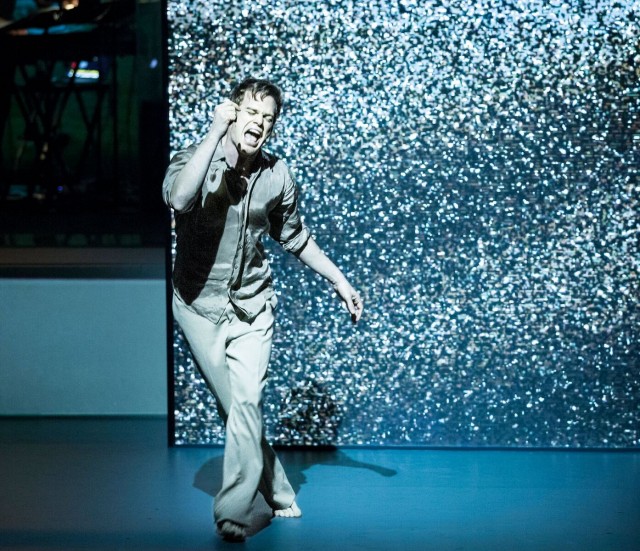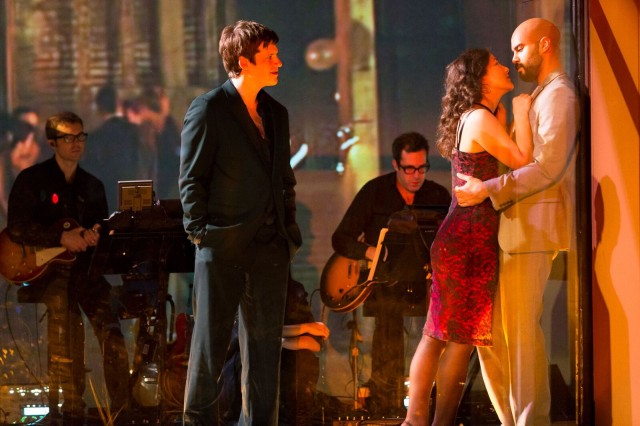
Michael C. Hall reprises David Bowie role from THE MAN WHO FELL TO EARTH in LAZARUS at NYTW (photo by Jan Versweyveld)
New York Theatre Workshop
79 East Fourth St. between Second & Third Aves.
Tuesday – Sunday through January 19, $129; Wednesday, January 20 benefit, $1,004 – $2,504
www.nytw.org
David Bowie’s resurrection after a long public absence continues with Lazarus, an intriguing, at times captivating, and often confusing musical drama at New York Theatre Workshop though January 20. A little over a decade ago, in June 2004, the iconoclastic British artist suffered a heart attack onstage and underwent emergency surgery. He stayed out of the limelight after that, making only rare appearances and not releasing a new record until 2013, The Next Day, declaring on the title track, “Here I am / Not quite dying / My body left to rot in a hollow tree / Its branches throwing shadows / On the gallows for me / And the next day / And the next / And another day.” But evidently with a renewed lust for life, Bowie has been very busy over the last few years, and he takes a fascinating look at his personal and professional past, present, and future in Lazarus, a multimedia collaboration with playwright Enda Walsh (Once, The Walworth Farce) and heavily in-demand director-of-the-moment Ivo van Hove (Scenes from a Marriage, A View from the Bridge). The show picks up some forty years after the end of The Man Who Fell to Earth, the 1976 Nicolas Roeg film in which Bowie portrayed Thomas Jerome Newton, an alien who comes to Earth to collect water to save his planet. As the audience enters the theater, Newton (Michael C. Hall) is lying flat on the stage, as if dead. He eventually rises, met by his old friend Michael (Charlie Pollock) and his new assistant, Elly (Cristin Milioti). Newton is now a retired, reclusive, wealthy former businessman who stays at home drinking gin and eating Lucky Charms and Twinkies, watching a large television screen that broadcasts things going on in his head as he agonizes over his loneliness, his wife and daughter long gone from his life. “Don’t you remember the person you were? Your life outside,” Michael asks. “That was before,” Newton answers. “And it’s all gone?” Michael says. “Of course it’s gone,” Newton responds shortly before singing “Lazarus,” one of four new songs Bowie has written for the show. “Look up here, I’m in heaven / I’ve got scars that can’t be seen / I’ve got drama, can’t be stolen / Everybody knows me now / Look up here, man, I’m in danger / I’ve got nothing left to lose,” Hall sings in a strong Bowie accent. The music is performed live by a band in a glassed-in booth across the back of the stage, behind Jan Versweyveld’s apartment set, which features a refrigerator at the right (next to a record player on the floor with a pile of Bowie LPs), a bed at the left, and a large screen at the center. Newton is soon visited by a young girl (Sophia Anne Caruso) who he knows is a figment of his imagination, there to help him find purpose in his life, as well as hers. “You’re not dying, are you?” she asks. “A little bit every day. I’m a dying man who can’t die,” he says. “That’s a joke, right?” she replies. “Yes, not being able to die is a joke. A fucking terrible joke,” he states. Newton’s life is further complicated by three teenage girls (Krystina Alabado, Krista Pioppi, and Brynn Williams) who form a kind of Greek chorus, the mysterious Valentine (Michael Esper), Elly’s jealous husband, Zach (Bobby Moreno), and a couple madly in love, Maemi (Lynn Craig) and Ben (Nicholas Christopher).

Ivo van Hove’s LAZARUS uses David Bowie songs to explore love and loneliness (photo by Jan Versweyveld)
Lazarus was inspired by Walter Tevis’s 1963 science-fiction novel, The Man Who Fell to Earth, in which Newton is described thusly: “He was human; but not, properly, a man. Also, man-like, he was susceptible to love, to fear, to intense physical pain and to self-pity.” Hall (Hedwig and the Angry Inch, Cabaret) embodies the character with a tender simplicity despite the craziness that Newton is experiencing. As the girl, Caruso again shows intelligence and instincts well beyond her fourteen years, as she did earlier in 2015 in Jennifer Haley’s The Nether. The music, consisting of new arrangements of Bowie classics and deep cuts, from 1970’s The Man Who Sold the World, 1971’s Hunky Dory, 1980’s Scary Monsters, and The Next Day, in addition to the four new songs, is a treat for Bowie fans, especially the Japanese and English “It’s No Game (Part 1),” Pollock’s “The Man Who Sold the World,” Hall’s “Where Are We Now?” and “Killing a Little Time,” and Caruso’s “Life on Mars.” In a soft, gentle version of “Changes,” Tony nominee Milioti (Once) sings “Turn and face the strange,” and strangeness is just what keeps this production from soaring into the stratosphere. Too much of Lazarus, which is about love and loss and making connections, is head-scratchingly opaque, particularly the use of the video monitor; Tal Yarden’s projections are occasionally poetic and visually striking but much more often bewildering, muddying the narrative with perplexing shots that could be memories, long-gone dreams and desires, or — well, by the time Alan Cumming appears onscreen, you can forget about trying to figure out what’s going on. But if you instead concentrate on Hall’s thrilling performance, the central relationship between Newton and the girl, and the outstanding musical numbers, Lazarus will lift you up, making you thankful that Bowie has returned to Earth to share his unique, and plenty strange, world view with us mere mortals again.